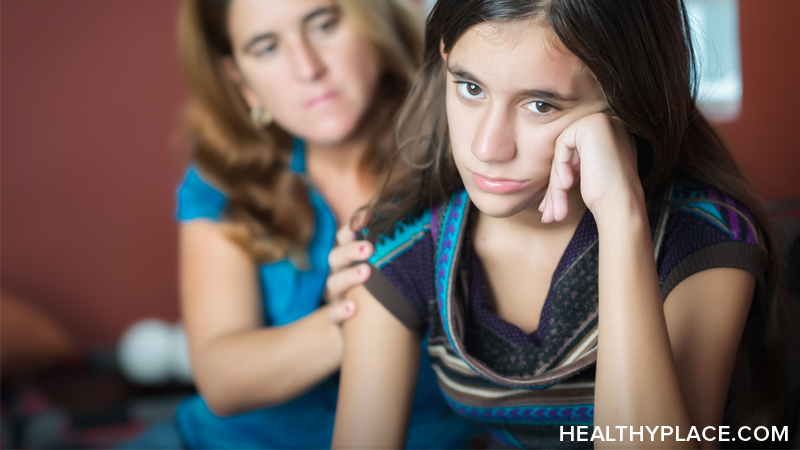Communicating with Your Depressed Child

If your child is down or depressed, it's important to talk about it. Here are suggestions for communicating with your depressed child or teen.
Even though a depressed child may be hard to talk to, it is really important for someone to try to make contact and to understand what has set off the depression. If parents do not have success with this, get help from someone the child can trust. This may be a relative (for example, aunt or grandparent), friends or someone from the child's school.
In talking to children the following things are important.
- Listening to what they have to say, really listening. This is easier said than done and means not interrupting, not reacting and saying "that's silly" or, "it's your own fault", or even leaping in to try and cheer up or reassure. Just let children say whatever they can say and try to imagine what they are feeling as they speak.
- You can ask a few questions to help understand the child's story, but do not quiz them, or ask 'why'. They may not know 'why', but they may know how they feel and they may know what they want to be different.
- Showing you have heard is helpful, by repeating the words the children have used or, writing them down.
- Letting them know you can see how they feel is also helpful. e.g. "I can see you are very sad about it".
- If children cannot talk about it, they may be able to draw something that shows how they feel, or show it with dolls or puppets, or find a song or book that describes it.
- Say and show you care how they feel. Sometimes a parent just holding and cuddling a child can do more to make the child feel better than all the words in the world. For friends and teachers a hug around the shoulder, a touch on the arm or just sitting alongside can show you care.
- There are some topics you might mention just in case the child is too embarrassed or afraid and needs you to start. Ask if anyone is hurting them and has told them not to tell. Tell them nothing is too awful to talk about, and that you will love them no matter what happened.
Once you feel you have tried to understand the reason for the child's sadness here are some suggestions.
- Tell the child that feelings of sadness do get better eventually and that there are things that can be done to help that happen.
- If children are blaming themselves for something unreasonably, tell them they are not to blame.
- Offer practical help to make a plan for change. There may be a lot of things that can be changed; help in making new friends, finding activities the child can succeed at, taking the pressure off by stopping some activities, protection from a bully at school or from an abusive person.
- Make sure children know they have the support and someone to turn to when the feelings get bad, especially when the situation is something that won't change (such as a death or divorce).
- Help children learn to notice what makes the feelings worse and what helps.
- Help children find ways to express sad feelings. Boys may need particular help with this.
- Make sure the children know this could happen to anyone - they are not weird or strange.
- Encourage or help the child to do the things you know they used to enjoy.
- Notice the things they do well and tell them about it.
- Get a physical checkup with a doctor.
- Encourage or help children to eat well (offer their favorites), get some exercise and find ways to relax.
- Make sure your children know you love and approve of them.
If the child's sadness is not helped by what you have done or you cannot find a reason for the depression, it would be wise to seek professional help.
Sometimes this is hard for parents to do, from fear of what others will think of them. It is important you don't let this stop you getting help for your child. People will respect you for seeking help.
Sources:
- Barbara D. (1996). 'Lonely, sad and angry: a parent's guide to depression in children and adolescents'. Main Street Books.
- Graham P. and Hughes C. (1995). 'So Young. So Sad. So Listen'. Bell and Bain: Glasgow.
- Children, Youth and Women's Health Service
APA Reference
Staff, H.
(2008, November 15). Communicating with Your Depressed Child, HealthyPlace. Retrieved
on 2026, March 4 from https://www.healthyplace.com/parenting/depression/communicating-with-your-depressed-child



